牛津英语七年级上册期末复习知识点整理
牛津英语七年级上册期末复习知识点整理
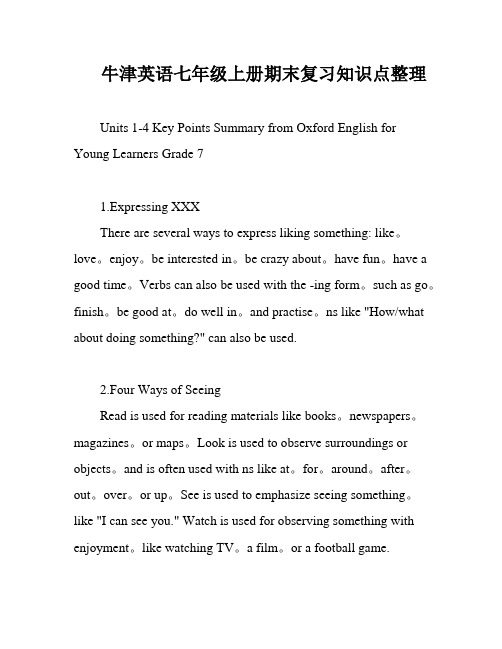
牛津英语七年级上册期末复习知识点整理Units 1-4 Key Points Summary from Oxford English for Young Learners Grade 71.Expressing XXXThere are several ways to express liking something: like。
love。
enjoy。
be interested in。
be crazy about。
have fun。
have a good time。
Verbs can also be used with the -ing form。
such as go。
finish。
be good at。
do well in。
and practise。
ns like "How/what about doing something?" can also be used.2.Four Ways of SeeingRead is used for reading materials like books。
newspapers。
magazines。
or maps。
Look is used to observe surroundings or objects。
and is often used with ns like at。
for。
around。
after。
out。
over。
or up。
See is used to emphasize seeing something。
like "I can see you." Watch is used for observing something with enjoyment。
like watching TV。
a film。
or a football game.3.XXX Ways of DressingPut on emphasizes the n of putting on something。
牛津英语七年级上册期末复习知识点整理

牛津英语七年级上册期末复习知识点整理译林版牛津英语七年级上册期末复知识点整理Units1--4重点知识点总结n.名词v.动词vt.及物动词vi.不及物动词adj.形容词adv.副词prep.介词pron.代词conj.连词1、喜欢like / love / enjoy / be XXX (痴迷于)/ have fun / have a good time +doing sth.动词+doing的还有Go XXX good at doing sth./ do well in doing sth.XXX.2、“四大看”read vt.看读物(XXX等)look vi.瞧常用短语look at/ for/around/after/out/over/upsee vt.瞥见,夸大成效I can see you.watch vt.带有观赏性的寓目watch TV/ a film / a football game3、“五大穿着”Put on强调“穿上”的动作XXX ____XXX.Wear强调“穿着”的状态;进行时态表示暂时的情况XXX glassesDress(1)dress sb.(2) dress oneself(3) dress up as(4) get dressedIn(穿戴)后接颜色(或衣服),表示状态look!XXX is_____a XXX后接人指衣服穿在某人身上看出区别来。
The red coat looks nice on you.4、“四大花费”XXX:sb.(人)+ XXX.sb.(人)+ spend +工夫/款项+(in) XXX.pay:sb.(人)+pay +款项+for sth.cost:sth.(物)+ cost + sb.+金钱XXX时间XXX:it XXX sb. +时间+ to do sth.5、“三大地点副词”Home / there /here前不加任何的介词welcome home / come here / go there6、“三大使役动词”Make sb. do sth./ have sb. do sth. / let sb.do sth.7、晤面打号召用语(1)Nice to meet you . (2) Glad to meet you . (3) How are you ? (4) How are you doing ?(5)How is it going ?(6)How is everything going?(7) What’s up?8、基数词+year(s)+old透露表现“…岁”发问用“how old”名词性短语数词-year-old也透露表现年岁,但其为描述词性短语“前有冠词后著名(词)”Eg. Helen is 11 years old = Helen is an 11-year-old girl.9、Let’s与let us的区分Let’s do sth.指包括听者(对方)和说者(我们)都在内,表示建议Let us do XXX.指“让(允许)我们做某事”而听者(对方)不做,只有“我们”做10、play+the+乐器类名词e.g. Play the pianoPlay +球类活动play+ football / play cards / play chess11、She comes from Shanghai= She is from Shanghai .注:如何提问Shanghai及如何改一般疑问句12、be good at =do well in = be clever at = study sth. wellBe good at (反) be bad atdo well in (反) be poor in13、介词over的用法(1)”在…正上方” There is a bridge over the river.(2)”超出”A plane flies over the house(3)”跨越” There are over 20 boys in this class.(4)”竣事” Class is over! / Game is over.14、every one与everyone辨析区分(1)Every one能够与of连用,而everyone却不克不及与of连用Eg.every one of the children XXX.(2) XXX只指人=everybody而every one既指人又可指物配合点:谓语动词都要用“三单”15、family的用法:“家庭”作为团体谓语动词用“单数”He has a big family.“家人”夸大成员,是复数寄义,谓语动词用“真相” My family are at home.拓展:个人名词有people、class、police、sheep、deer、furniture等16、all/ both/ each/every/neither/ either的用法all(1)三者或三者以上“全部、都”(2)all + the +名词(all the afternoon = the whole afternoon)(3)all放在行为动词前,名词前;be动词后(4) all of +宾格/名词复数Both(1)二者都(2)后可跟of +宾格/名词复数Both sides of XXX指两个或两个以上“每个”个别Each side of the XXX.Every指良多人或事物的“部分”后接名词单数Every student is here .一切人都在。
2024秋沪教牛津新七年级英语上册知识点清单(背诵版)

2024秋沪教牛津新七年级上知识点清单handout(背诵版)Unit 1 Friendship重点词汇一、词性分类1.Nounsguitar吉他courage勇气;胆量friendship友谊;朋友关系admiration钦佩;赞赏respect尊敬;尊重support支持;鼓励trust信任;信赖survey调查quality品质;品德appearance外貌thought想法end 结局heart心2. verbsimprove改进;改善describe描述;形容rise 上升3. adjectiveshonest诚实的patient有耐心的confident自信的;有自信心的personal个性的caring 关心他人的;体贴人的straight直的dark褐色的;乌黑的same同—的;相同的basic基本的;基础的glad高兴的;愉快的4. adverbshowever然而二、词性转换1. courage n.勇气;胆量—encourage v.鼓励2. admiration n.羡慕;钦佩—admire v.羡慕;钦佩3. respect n.尊敬;尊重—respectful adj.表示敬意的;尊敬的4. support v.支持—supportive adj.支持的;鼓励的5. trust n.信任—trustful adj.轻信的trustworthy adj.值得信赖的6. appearance n.外貌;出现—appear v.出现;显得;似乎7. improve v改进;改善—improvement n.改进;改善8. describe v描述—description n.描述9. honest adj.诚实的—honesty n.诚实—dishonest adj.不诚实的10. patient adj.有耐心的—patience n.耐心impatient adj.没有耐心的11. confident adj.自信的;有信心的—confidence n.信心三.一词多义1. respect n.& v尊敬;尊重 3. trust n. & v.信任;信赖2. support n.& v支持;鼓励 4..straight adj.直的adv.笔直地;径直重点短语1. be good at擅长10. watch over照管;监督2. turn to sb. for help向某人求助11. rise into 上升到3. after school放学后12.cry out大叫;叫喊4. be willing to do 愿意做某事13. cry oneself to sleep哭着入睡5. thanks to多亏了14. wake up醒;醒来6. count on依靠(=depend on)15. come and go来去7. medium height中等身高16. take somebody's place替代某人8. modern dance现代舞17. come along 出现9. take care of照顾(= look after / care for)核心句式1. What do you like doing?你喜欢做什么?2.Li Hua is helpful and patient.李华乐于助人且有耐心。
译林版牛津英语七年级上册期末复习知识点
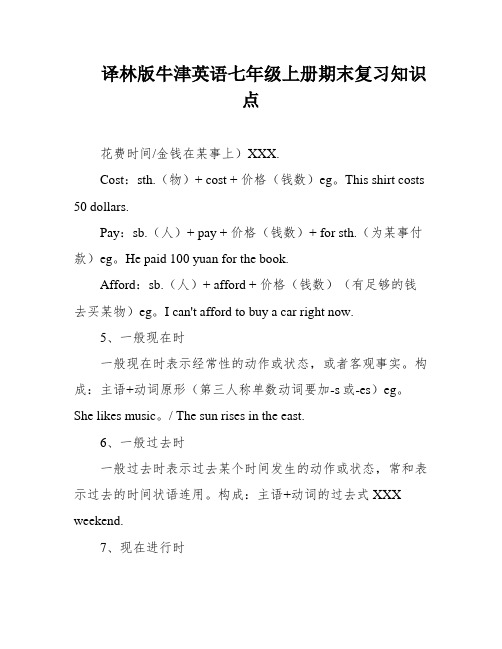
译林版牛津英语七年级上册期末复习知识点花费时间/金钱在某事上)XXX.Cost:sth.(物)+ cost + 价格(钱数)eg。
This shirt costs 50 dollars.Pay:sb.(人)+ pay + 价格(钱数)+ for sth.(为某事付款)eg。
He paid 100 yuan for the book.Afford:sb.(人)+ afford + 价格(钱数)(有足够的钱去买某物)eg。
I can't afford to buy a car right now.5、一般现在时一般现在时表示经常性的动作或状态,或者客观事实。
构成:主语+动词原形(第三人称单数动词要加-s或-es)eg。
She likes music。
/ The sun rises in the east.6、一般过去时一般过去时表示过去某个时间发生的动作或状态,常和表示过去的时间状语连用。
构成:主语+动词的过去式XXX weekend.7、现在进行时现在进行时表示现在正在进行的动作,常和now。
XXX。
currently等时间状语连用。
构成:主语+be动词(am/is/are)+动词-XXX.8、一般将来时一般将来时表示将来某个时间要发生的动作或状态,常和表示将来的时间状语连用。
构成:主语+will/shall+动词原形eg。
I will go to Beijing next month。
/ She shall visit her XXX.9、情态动词情态动词有can/could。
may/might。
must。
shall/should。
will/would。
ought to等。
它们的用法有所不同,但都表示某种语气或情态。
eg。
You should study hard for the exam。
/ She must be at home now.10、被动语态被动语态表示动作的承受者在句子中作主语,动作的执行者在句子中用by引出。
2024秋沪教牛津新七年级上册知识点清单(默写版)
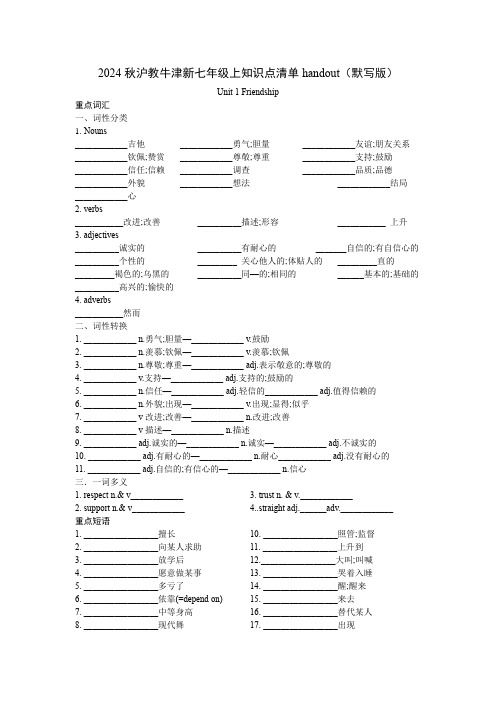
2024秋沪教牛津新七年级上知识点清单handout(默写版)Unit 1 Friendship重点词汇一、词性分类1.Nouns____________吉他____________勇气;胆量____________友谊;朋友关系____________钦佩;赞赏____________尊敬;尊重____________支持;鼓励____________信任;信赖____________调查____________品质;品德____________外貌____________想法____________结局____________心2. verbs___________改进;改善__________描述;形容___________ 上升3. adjectives__________诚实的__________有耐心的_______自信的;有自信心的__________个性的_________ 关心他人的;体贴人的_________直的_________褐色的;乌黑的__________同—的;相同的______基本的;基础的__________高兴的;愉快的4. adverbs___________然而二、词性转换1. ____________ n.勇气;胆量—____________ v.鼓励2. ____________ n.羡慕;钦佩—____________ v.羡慕;钦佩3. ____________ n.尊敬;尊重—____________ adj.表示敬意的;尊敬的4. ____________ v.支持—____________ adj.支持的;鼓励的5. ____________ n.信任—____________ adj.轻信的____________ adj.值得信赖的6. ____________ n.外貌;出现—____________ v.出现;显得;似乎7. ____________ v改进;改善—____________ n.改进;改善8. ____________ v描述—____________ n.描述9. ____________ adj.诚实的—____________ n.诚实—____________ adj.不诚实的10. ____________ adj.有耐心的—____________ n.耐心____________ adj.没有耐心的11. ____________ adj.自信的;有信心的—____________ n.信心三.一词多义1. respect n.& v____________ 3. trust n. & v.____________2. support n.& v____________ 4..straight adj.______adv.____________重点短语1. _________________擅长10. _________________照管;监督2. _________________向某人求助11. _________________上升到3. _________________放学后12._________________大叫;叫喊4. _________________愿意做某事13. _________________哭着入睡5. _________________多亏了14. _________________醒;醒来6. _________________依靠(=depend on)15. _________________来去7. _________________中等身高16. _________________替代某人8. _________________现代舞17. _________________出现9. _________________照顾(= look after / care for)核心句式1.你喜欢做什么?___________________________________________________________ 2.李华乐于助人且有耐心。
牛津译林版七年级上英语期末复习全册知识点归纳
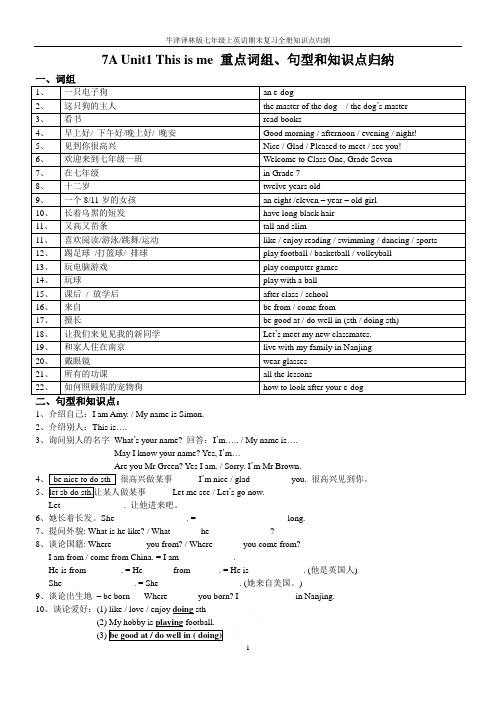
7A Unit1 This is me 重点词组、句型和知识点归纳1、介绍自己:I am Amy. / My name is Simon.2、介绍别人:This is….3、询问别人的名字What’s your name? 回答:I’m….. / My name is….May I know your name? Yes, I’m…Are you Mr Green? Yes I am. / Sorry. I’m Mr Brown.4很高兴做某事I’m nice / glad _________you. 很高兴见到你。
5Let me see / Let’s go now.Let ______________. 让他进来吧。
6、她长着长发。
She _____ _____ _____. = _______ ______ ______ long.7、提问外貌: What is he like? / What ______ he ______ _______?8、谈论国籍: Where _______ you from? / Where ______ you come from?I am from / come from China. = I am ____________.He is from _______ . = He ______ from ______. = He is ____________. (他是英国人)She ________________. = She __________________. (她来自美国。
)9、谈论出生地–10、谈论爱好:She is good at swimming. = She does well in dancing. = She ______ ______.= She is a _____ _______.注意do well in 的否定句例如:他不擅长跳舞。
沪教牛津版英语七年级上册知识点总结

Unit 11来自be from=come from2和...住在一起live with...3靠近.. close to=near4艺术老师an Art teacher5姐姐an elder sister6乘车上学go to school by bus / take a bus to school7 擅长be good at doing sth. = do well in doing sth.8交朋友make friends with...9来自世界各地的朋友people from all over the world =around10 发邮件给某人email sb.11 离...很远far away from....12 .....的意思是the meaning of . (13)在某人的空余时间in one’s free time14 …的答案是the answer to …15 一个德国女孩a German girl16 在互联网上on the Internet17 放风筝fly a kite / fly kites18 收到某人来信hear from sb= receive / get a letter from19 最美好祝愿best wishes20 许多朋友a lot of / lots of / many friends21 洗澡take a bath22 想做某事would like to = want to … 23 你多大了?What’s your age?/ How old are you?24 完成complete=finish4. work as + 职位名称作为…而工作6. walk to school=go to school on foot 走路去上学7. be keen on (doing) sth=be interested in 对….感兴趣8. enjoy (doing) sth= like doing sth 喜欢做某事9. reply to sb回信给某人11. a photo of 一张…的图片13. speak Chinese 说中文15. in the middle 在中间20. write to sb写信给某人,注意pay attention to 以…开始begin with 参考书reference book语法1:特殊疑问词及其引导的特殊疑问句(what, where, when, how, why, which)What refers to things.对事物提问(什么)(可以用来询问职业) Where refers to places.对地点提问(在哪里)Who refers to persons.对人提问(谁)How refers to ways.对年龄提问(多大年纪,几岁)How old refers to ages.对某人或情况提问(怎么样)When refers to times.对时间提问(何时)what time (只能用来问具体几点钟)Why refers to reasons.对原因提问(为什么)which refers to kinds (种类).对事物或人称提问(哪一个,哪一位)How many refers numbers.对数量提问(多少)How old ...多大年纪How often ... 多经常,多久一次How far... 多远How long ... 多长时间How soon 多快,多语法2:不定冠词的用法不定冠词有a和an两个,仅用在单数可数名词前。
牛津深圳英语七年级上册英语全册语法复习提纲(实用,必备!)
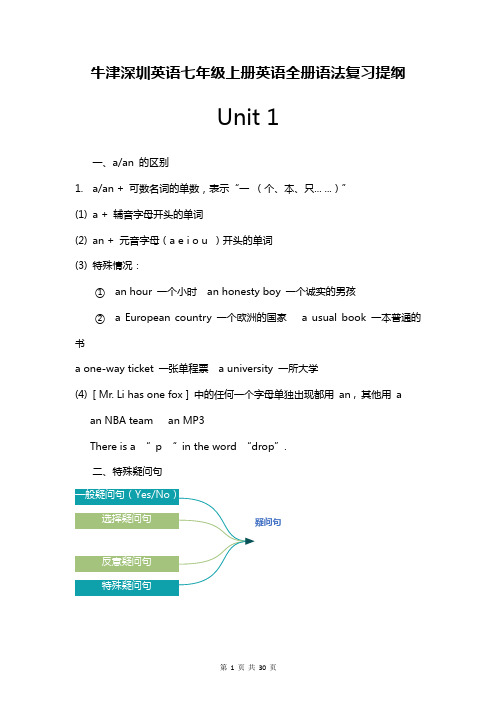
牛津深圳英语七年级上册英语全册语法复习提纲Unit 1一、a/an 的区别1.a/an + 可数名词的单数,表示“一(个、本、只... ...)”(1)a + 辅音字母开头的单词(2)an + 元音字母(a e i o u )开头的单词(3)特殊情况:①an hour 一个小时an honesty boy 一个诚实的男孩② a European country 一个欧洲的国家 a usual book 一本普通的书a one-way ticket 一张单程票 a university 一所大学(4)[ Mr. Li has one fox ] 中的任何一个字母单独出现都用an , 其他用aan NBA team an MP3There is a “p “in the word “drop”.二、特殊疑问句1.结构:特殊疑问词+ 一般疑问句2.常见的特殊疑问词:(1)What 什么(2)Which 哪一(个,本,页.......)(3)Why 为什么(4)How 如何,怎样(5)When 什么时候(6)Where 哪里(7)Who 谁whose 谁的(8)How long 多长(问长度),多长时间eg. How long is this room?How long do you stay in Shenzhen?(9)How far 多远(问距离)eg. How far is it from your home to your school?(10)How many:多少(问可数名词的数量)How many + 可数名词复数+ 其他?How many books do you have?How many people are there in your family?(10)How much 多少(问不可数名词数量);多少钱(问价格)问数量:How much + 不可数名词+ 其它?How much money do you have?问价格:How much + be(is/are)+ 物体?How much is this book?How much are these apples?(11)How often:多久一次(问频率)—How often do you go to school?—Five times a weekonce 一次twice 两次three times 三次four times 四次(12) How soon: 多快—How soon will you come back?—In two days.(13) How often:多久一次(问频率)How often do you go to school?你多久上一次学?Five times a week 一周五次once 一次twice 两次three times 三次four times 四次(14)How soon :多快(将来时)How soon will you come back?In four days 四天后3.(1)问天气:How is the weather=What is the weather like?(2)问年龄:①How old + be (is/are) + sb. ?②How old are you?③How old is your mother?④What ‘s sb’s age?(3)问工作①What be (is/are) + sb. ?②What is he?③What are you?④What do/does sb. do? What do you do?(3)问日期:what date is it today?=what is the date today? 今天是几号?(4)问星期:what day is it today?= what is the day today? 今天是星期几?(5)问时间点:What time is it now?= what is the time now? 现在是几点?Unit 2一般现在时:(和时间有密切关系)一、谓语1.我喜欢你主语谓语宾语他每天学习英语主语时间状语谓语宾语二、什么情况下可以使用一般现在时1.经常性、习惯性动作2.表示兴趣、爱好3.事物的一般特性4.客观事实、科学真理三、结构(一)谓语是be动词1.肯定句:主语+Be+其他I am a teacher. They are from China. He isgood at English(1)am 主语为I(2)is 主语为第三单(3)are 主语为you 和复数2.否定句:主语+Be +not +其他(1)I am not a teacher.(2)They are not from China.aren’t(3)He is not good at Englishisn’t(4)Xiaoming and I are not friends.aren’t3.一般疑问句:Be + 主语+ 其他?(1)Are you a teacher ? Yes, I am. No, I am not.(2)Are they from China? Yes, they are. No, they aren’t.(3)Is he good at English? Yes, he is . No, he isn’t.(4)Are xiaoming and you friends? Yes, we are. No, we aren’t.(二)谓语是其他动词1.肯定句:(1)主语+动词原形+其他(2)主语+动词第三单+其他(主语为第三单)I like you.He likes you.They go to school every day.He goes to school every day.2.否定句:(1)主语+don’t+动词原形+其他(2)主语+doesn’t+动词原形+其他(主语为第三单)I don’t like you.He doesn’t like you.They don’t go to school every day.He doesn’t go to shool.3.一般疑问句:(1)Do+主语+动词原形+其他?(2)Does+主语+动词原形+其他?(主语为第三单)Do you like me? Yes, I do. No, I don’t.Does he like you? Yes, he does. No, he doesn’t.四、时间标志词1.always(一直)usually(经常地)sometimes(有时)seldom(很少)never(从不)2.every (day, week, month, year......)3.once a day 一天一次twice a year 一年两次four times a week一周四次五、如何把动词变成第三人称单数1.在词尾+ “s”play—plays like—likes2.辅音字母+y结尾,改y为i,+ “es”study—studies cry—cries3.以s, sh,ch, x, o 结尾,+“es”go—goes wash—washes4.have—hasUnit 3名词:可数名词单数复数不可数名词一、如何把可数名词单数变为复数(一)规则变化1.+“s”cake —cakes pen—pens2.辅音+y结尾,改y为i,+“es”city—cities story—stories3.以s, x, sh, ch 结尾,+“es”box—boxes glass—glasses watch—watches4.以o结尾,有生命,+“es”tomato—tomatoes hero—heroes无生命,+“s”,zoo —zoos; photo—photos5.以f\fe 结尾,把f\fe 改为vesleaf —leaves knife—knivesroof—roofs safe—safes(二)不规则变化1.foot—feet tooth—teeth goose—geese man—men woman—women2.deer—deer sheep—sheep fish—fish Chinese—ChineseJapanese —Japanese3.child—children mouse—micea woman teacher two women teachers a man doctor two men doctorsan apple tree two apples trees二、不可数名词(一)常见不可数名词1.液体:water milk cola coffee tea juice orange oil2.可随意切割:meat beef chicken glass bread paper3.难分:sand rice hair4.气体:gas air(二)不可数名词的数量表达方法1.数字+量词+of+不可数名词a cup of tea 一杯茶two cups of tea 两杯茶2.常见量词:cup 杯glass 玻璃杯box 盒case 箱bay 袋/包basket 篮drop 滴piece 片、块、张pair 双、副、条3. a piece of paper two pieces of paper three pieces of paperThere be:有(某个地方有某物)1. There is a pen on the desk.2. There are two persons in the room.3.(1)There is a pen and two books on the desk.(2)There are two books and a pen on the desk.Have 有(某人有某物)I have a book. He has two sisters.Unit 4一、形容词(adj.).....的(一)一般修饰名词,放在名词前new pen beautiful house(二)修饰系动词,放在后面1.系动词(1)Be(2)感官动词: feel sound look taste smell(3)保持:stay keep remain(4)似乎:seem appear(5)变得:go get become turn grow二、如何把名词变成形容词1.+“al”person—personal 个人的nation—national 国家的nature—natural自然的centre—central 中心的2.+“y”(尤其和天气有关的)rain—rainy wind—windy snow—snowy fog—foggy luck—luckyhealth—healthy fun—funny3.+“ous”humor—humorous danger—dangerous4.+“ly”friend—friendly live—lively love—lovely week—weekly day—daily5.+“en”(和材料有关)wood—wooden gold—golden wool —woolen6.ce改为t silence—silent difference—different importance—importantconfidence—confident7.去e加y taste—tasty juice—juicy ice—icy8.+“ful”use—useful thank —thankful hope—hopeful care—carefulhelp—helpful9.+“less”(否定)care—careless hope—hopeless help—helplessuse—useless10.fool —foolish三、副词(adv.):一般以ly 结尾1.修饰实义动词(1)I run quickly.(2)He lives well.2.修饰一整句话,放在句首或句尾Luckily, he passed the exam.3.修饰形容词,放在形容词前He is specially handsome.四、如何把形容词变成副词1.+“ly”quick—quickly slow —slowly2.辅音+y结尾,改y为i,+ly happy—happily lucky—luckily3.以e结尾,去e加y possible —possibly gentle —gently4.形容词和副词同形:fast hard early weeklyUnit 5一般将来时一、使用条件:未来的某个时间将会发生的动作或存在的状态二、结构1.肯定句:(1)主语+will +动词原形(2)主语+be going to +动词原形(3)I will go to school tomorrow. I am going to go to school tomorrow.(4)He will visit you tomorrow. He is going to visit you tomorrow.2.否定句:(1)主语+will+not+动词原形(2)主语+be not +going to +动词原形(3)He will not visit you tomorrow.(4)I am not going to go to school tomorrow.3.一般疑问句:(1)Will +主语+动词原形?(2)Be+主语+going to +动词原形?(3)Will he visit you tomorrow? Yes, he will. No, i won’t.(4)Are you going to go to school tomorrow? Yes, I am. No, I am not.三、时间标志词tomorrow, next (week, month, year......) the day after tomorrowIn 2023 in+时间段in two days 两天后in a month 一个月后Unit 6if引导的条件状语从句一、句型If you study hard, you will pass the exam.If条件从句主句=You will pass the exam if you study hard.主句if条件从句二、①If you like sightseeing, you will love the beautiful place.②You can see many old buildings if you walk along the street.●情态动词:can 能could 能may可能might 可能need 需要must必须should 应该ought to 应该③Don’t stay there for too long if there are many people.●祈使句:(表示命令、要求、请求)A.结构:动词原形+其他Come in, please.B.Don’t +动词原形Don’t laugh. Don’t smoke hereC.let sb. do sth. Let me help you. Let us go.Unit 7一般过去时一、使用情况过去的某个时间发生的动作或存在的状态二、结构(一)谓语be动词1.肯定句(1)主语+be(was 单数/ were复数)+其他(2)I was a teacher ten years ago.(3)They were angry yesterday.(4)You were beautiful when you were young.2.否定句(1)主语+be+not+其他(2)I was not a teacher ten years ago.(3)They were not angry yesterday.(4)You were not beautiful when you were young.3.一般疑问句(1)Be +主语+其他?(2)Were you a teacher ten years ago? Yeas, I was. No, I wasn’t.(3)Were they angry yesterday? Yes, they were. No,they weren’t.(4)Were you happy when you were young? Yes, I was. No, I wasn’t.(二)谓语是其他动词1.肯定句(1)主语+动词过去式+其他(2)He played football yesterday.(3)I liked you ten years ago.2.否定句(1)主语+didn’t +动词原形+其他(2)He didn’t play football yesterday.(3)I didn’t like you ten years ago.3.一般疑问句(1)Did+主语+动词原形+其他?(2)Did he play football yesterday? Yes, he did. No, he didn’t.(3)Did you lie me ten years ago? Yes, I did. No, I didn’t.三、时间标志词XX ago: two days ago three weeks agoin 1995; last ( week, month, year.... )the day before yesterday四、如何把动词原形变成动词过去时1.+“ed”look—looked start—started2.以e结尾,+“d”live—lived hope—hoped3.辅音字母+y 结尾,改y为i加“ed”study—studied cry—cried4.辅+元+辅结尾的重读闭音节,双写最后一个字母,加“ed”stop—stopped plan—planned control—contolled skip—skipped5.不规则Unit 8人称代词指代人或物,有主格和宾格之分。
牛津深圳版七年级上册英语期末必备考点梳理汇编

牛津深圳版七年级上册英语期末必备考点梳理汇编题型一语法选择必备考点(15个考点)考点1、时态考点一般过去时考频5次一般现在时考频2次一般将来时考频2次1.Wang Ming is ________ busy with his study, so he ________ has time for fun.A.always; seldomB. always; oftenC. usually; oftenD. never; never2、We _____ have a big dinner with my grandparents in Guangzhou Restaurant this New Year’s Eve.A.are going toB. will be going toC. are going to beD. will going to be3、—Do you _______ walk to school?—No, _______. I live too far away.A. often, neverB. usually, oftenC. seldom, alwaysD. always, usually4、We all love _______ table tennis, and we _______ a good time playing it yesterday.A. playing, haveB. to play, havingC. playing, hadD. play, had5、Forests _______ us with food and fruit.A. is providedB. providesC. provideD. providing6、Did you have two bowls of rice and an egg for lunch, too?--No, I _______ some dumplings instead.A. haveB. will haveC. have hadD. had考点2: 非谓语考频7次非谓语考点:(2)非谓语作宾语只能加非谓语to do形式:(常考)to do/doing作宾语均可,但含义有区别:(常考)非谓语的否定:否非1. We must stop ________ our rubbish into the sea and under the ground.A. to putB. puttingC. putsD. put2、When the teacher came in, he saw all of us _______ and laughing, so he was a little bit angry.A. talkB. talkedC. talkingD.to talk3、Many children enjoy ______ picture books in their free time.A. readB. to readC. readsD. reading4、--What’s your dream?--My dream is ____ a dancer.A. beB. to beC. becomeD. becomes考点3、冠词考频6次(先翻译,后语法)1、--- Where did you have _______ lunch? --- We went to _______ restaurant.A. /, aB. a, theC. the, theD. a, a2.I want to be ______ computer engineer in the future, so I work on my computer for more than ____ hour every day.A.a; aB. a; anC. a; /D. /; an3、I think we can have _______ great time during the School Art Festival.A.theB. aC. anD.不填考点4、人称代词考频9次A. UsB. MyC. OursD. Our2、Guangzhou is a beautiful city. _________ famous for ________ flowers and delicious food.A. Its; it’sB. It’s; itsC. Its; itsD. It’s; it’s考点5、名词考频3次1、--- What would you like to have for breakfast?--- I would like some milk and ________.A.two breadB. two breadsC. two pieces of breadsD. two pieces of bread2、There are _______ on the table.A. two milkB. two bottles of milkC. much milkD. two bottles of milks3、Here is my schoolbag. Two _______ and a ruler are _______ it.A. pencils, aboveB. homework, underC. paper, onD. books, in4、This band is from ______. All the people in the band are _______.A. Germany; GermanB. Germen; GermanyC. Germans; GermanyD. Germany; Germans考点6、形式主语考频6次1、_______ is important for us to listen to our teacher carefully in class.A. ThatB. ItC. ThisD. As考点7、特殊疑问句考频11次主要考察特殊疑问词和回答的一一匹配1、--- ________ do you watch TV, Tim?--- Every night.A.How soonB. How longC. How oftenD. How far2、. --- How often do you send an email to your cousin? --- _______.A. Last weekB. For a monthC. Once a monthD. Next week3、--_______ do you exercise? --Three times a week.A. How longB. How oldC. How oftenD. How soon4、________ coffee do you want?--A little, thanks.A. How manyB. How muchC. WhatD. Which 考点8、there be 考频8次1、There _______ a talk about American country music in our school tonight.A. will haveB. is going to haveC. is going to hasD. will be考点9、介词考频15次1、Playing computer games too much is bad ________ our eyes.A.atB. aboutC. ofD. for2、He always watches TV _______ his family after dinner.A. underB. withC. byD. without3、--- Hi, Linda. Are you writing _______ Tom? --- Yes. I _______ him yesterday.A. to, heard outB. to, heard fromC. with, hear fromD. from, hear out4、Dinner time is _______ 6:00 _________ 7:30.A. /; toB. at; toC. from; toD. at; and考点10、连词考频2次考点11、状语从句13 次1、Peter will call you if he ________ Guangzhou.A. get toB. got toC. gets toD. will get to2、If you _______ free, please come here tomorrow.A. wasB. will beC. wereD. are考点12、两花考频2次1、Every day I spend about two hours _______ my homework.A. to finishB. finishingC. finishesD. finish考点13、形容词,副词考频5次1、The basketball match was very great. We were all ________ about it.A.exciteB. excitesC. excitedD. exciting2、We are _______ in the _______ film.A. interested, interestingB. interesting, interestingC. interested, interestedD. interesting, interested考点14、代词a few、few、little、a little 考频3次1.1 a little 具备副词词性,其后可修饰形容词;2.3 a few、few、little、a little 具备形容词词性:(2)many/much 考频1次(3)代词other 考频2词(4)复合不定代词:考频4次考点15 其他考点(1)情态动词考频2次1、-Would you please ________ in front of me?--Sorry, I’d like _______ next to you.A. sit; to sitB. to sit; to sitC. sit; sitD. to sit; sit(2)感叹句考频1 次A. HowB. WhatC. How aD. What a(3)其他短语【2021花都区期末英语】语法选择(共10小题;每小题1分,满分10分)。
(完整word版)牛津七年级上英语知识点总结
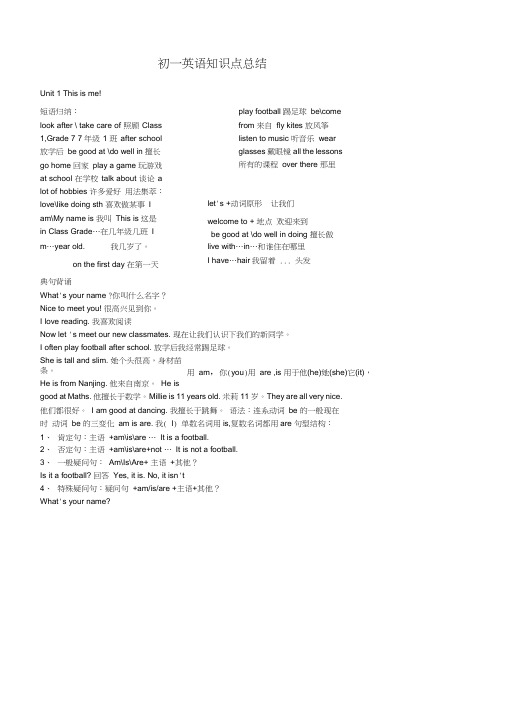
初一英语知识点总结Unit 1 This is me!短语归纳:look after \ take care of 照顾Class 1,Grade 7 7年级1 班after school 放学后be good at \do well in 擅长go home 回家play a game 玩游戏at school 在学校talk about 谈论a lot of hobbies 许多爱好用法集萃:love\like doing sth 喜欢做某事I am\My name is 我叫This is 这是in Class Grade…在几年级几班I m…year old. 我几岁了。
on the first day 在第一天play football 踢足球be\comefrom 来自fly kites 放风筝listen to music 听音乐wearglasses 戴眼镜all the lessons所有的课程over there 那里let's +动词原形让我们welcome to + 地点欢迎来到be good at \do well in doing 擅长做live with…in…和谁住在哪里I have…hair我留着 ... 头发典句背诵What's your name ?你叫什么名字?Nice to meet you! 很高兴见到你。
I love reading. 我喜欢阅读Now let 's meet our new classmates. 现在让我们认识下我们的新同学。
I often play football after school. 放学后我经常踢足球。
She is tall and slim. 她个头很高,身材苗条。
He is from Nanjing. 他来自南京。
He isgood at Maths. 他擅长于数学。
Millie is 11 years old. 米莉11 岁。
牛津初中英语七年级上册短语总结
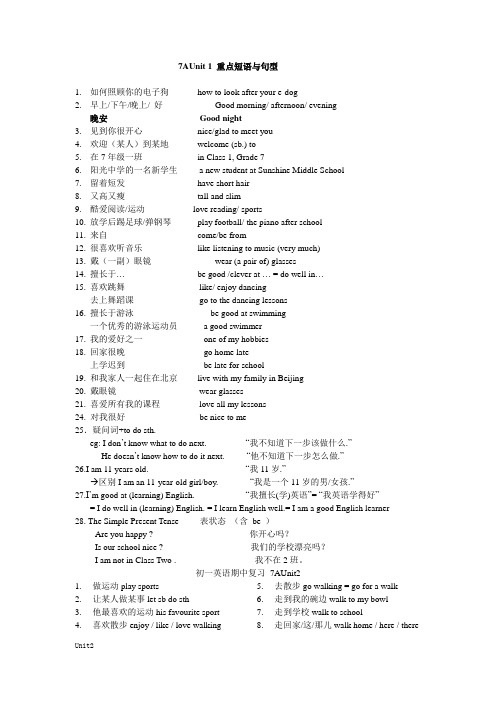
7AUnit 1 重点短语与句型1.如何照顾你的电子狗how to look after your e-dog2.早上/下午/晚上/ 好Good morning/ afternoon/ evening晚安Good night3.见到你很开心nice/glad to meet you4.欢迎(某人)到某地welcome (sb.) to5.在7年级一班in Class 1, Grade 76.阳光中学的一名新学生 a new student at Sunshine Middle School7.留着短发have short hair8.又高又瘦tall and slim9.酷爱阅读/运动love reading/ sports10.放学后踢足球/弹钢琴play football/ the piano after school11.来自come/be from12.很喜欢听音乐like listening to music (very much)13.戴(一副)眼镜wear (a pair of) glasses14.擅长于…be good /clever at … = do well in…15.喜欢跳舞like/ enjoy dancing去上舞蹈课go to the dancing lessons16.擅长于游泳be good at swimming一个优秀的游泳运动员 a good swimmer17.我的爱好之一one of my hobbies18.回家很晚go home late上学迟到be late for school19.和我家人一起住在北京live with my family in Beijing20.戴眼镜wear glasses21.喜爱所有我的课程love all my lessons24. 对我很好be nice to me25.疑问词+to do sth.eg: I don’t know what to do next. “我不知道下一步该做什么.”He doesn’t know how to do it next. “他不知道下一步怎么做.”26.I am 11 years old. “我11岁.”区别I am an 11-year-old girl/boy. “我是一个11岁的男/女孩.”27.I’m good at (learning) English. “我擅长(学)英语”= “我英语学得好”= I do well in (learning) English. = I learn English well.= I am a good English learner 28. The Simple Present Tense ----- 表状态(含be )Are you happy ? 你开心吗?Is our school nice ? 我们的学校漂亮吗?I am not in Class Two . 我不在2班。
沪教牛津版七年级英语上册知识点归纳汇总
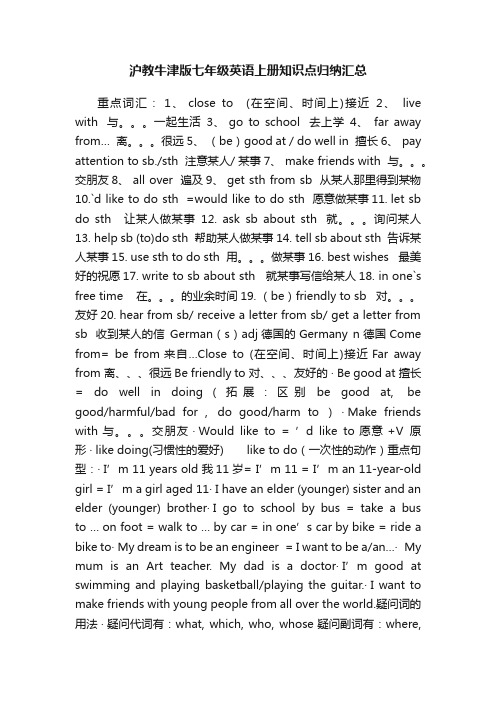
沪教牛津版七年级英语上册知识点归纳汇总重点词汇: 1、 close to (在空间、时间上)接近2、live with 与。
一起生活3、 go to school 去上学4、far away from… 离。
很远5、(be)good at / do well in 擅长6、 pay attention to sb./sth 注意某人/ 某事7、 make friends with 与。
交朋友8、 all over 遍及9、 get sth from sb 从某人那里得到某物10.`d like to do sth =would like to do sth 愿意做某事11. let sb do sth 让某人做某事12. ask sb about sth 就。
询问某人13. help sb (to)do sth 帮助某人做某事14. tell sb about sth 告诉某人某事15. use sth to do sth 用。
做某事16. best wishes 最美好的祝愿17. write to sb about sth 就某事写信给某人18. in one`s free time 在。
的业余时间19. (be)friendly to sb 对。
友好20. hear from sb/ receive a letter from sb/ get a letter from sb 收到某人的信German(s)adj 德国的 Germany n 德国 Come from= be from 来自…Close to (在空间、时间上)接近 Far away from 离、、、很远Be friendly to 对、、、友好的· Be good at 擅长= do well in doing(拓展:区别be good at, be good/harmful/bad for , do good/harm to )· Make friends with 与。
牛津上海版七年级英语上册期末知识点复习汇总
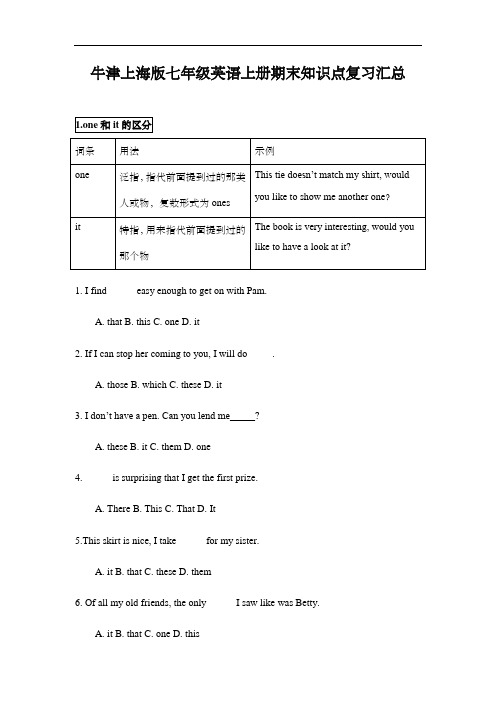
牛津上海版七年级英语上册期末知识点复习汇总1. I find _____ easy enough to get on with Pam.A. thatB. thisC. oneD. it2. If I can stop her coming to you, I will do_____.A. thoseB. whichC. theseD. it3. I don’t have a pen. Can you lend me_____?A. theseB. itC. themD. one4. _____ is surprising that I get the first prize.A. ThereB. ThisC. ThatD. It5.This skirt is nice, I take _____ for my sister.A. itB. thatC. theseD. them6. Of all my old friends, the only _____ I saw like was Betty.A. itB. thatC. oneD. thisbe surprised to do sth做某事感到惊讶( )1. Everyone _______hear the news yesterday evening.A. was surprised toB. was surprised atC. were surprised toD. were surprised at( )2. She _______Tom’s absence.A. was surprised toB. was surprised atC. were surprised toD. were surprised atbe dangerous to swim,“游泳很危险”。
“be +形容词+to do sth”,意为“做某事怎么样”。
上海牛津版英语七年级上知识点
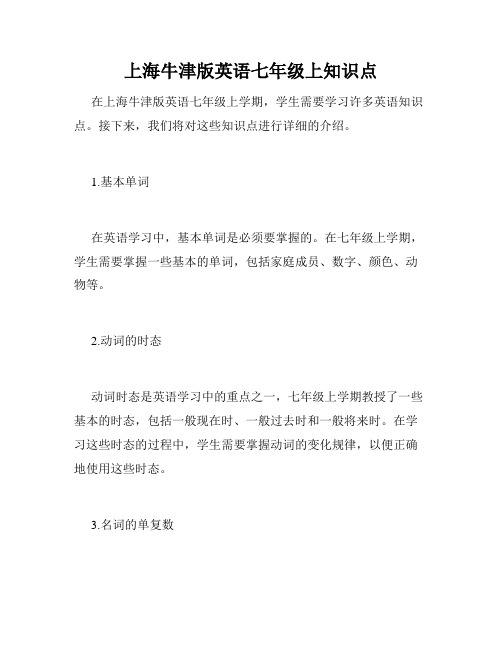
上海牛津版英语七年级上知识点在上海牛津版英语七年级上学期,学生需要学习许多英语知识点。
接下来,我们将对这些知识点进行详细的介绍。
1.基本单词在英语学习中,基本单词是必须要掌握的。
在七年级上学期,学生需要掌握一些基本的单词,包括家庭成员、数字、颜色、动物等。
2.动词的时态动词时态是英语学习中的重点之一,七年级上学期教授了一些基本的时态,包括一般现在时、一般过去时和一般将来时。
在学习这些时态的过程中,学生需要掌握动词的变化规律,以便正确地使用这些时态。
3.名词的单复数名词的单复数也是英语学习中必须要掌握的内容之一。
在七年级上学期,学生需要学习名词单数变复数的规则,并能正确地运用这些规则。
4.形容词与副词形容词和副词是描述词语,但是它们的用法不同。
在七年级上学期,学生需要学会正确地区分形容词和副词,并且学会正确地运用它们。
5.日常交际用语在英语学习中,交际用语非常重要,因为它们是日常交流中非常常用的词语。
在七年级上学期,学生需要学习一些常用的交际用语,例如问候、感谢、道别等等。
6.课堂表达在英语学习中,课堂表达具有非常重要的作用。
在七年级上学期,学生需要学会正确地表达自己的意思,包括用英语提问、回答问题,以及进行简单的口语交流。
7.听、说、读、写听、说、读、写是英语学习的四个方面,它们是相互关联的。
在七年级上学期,学生需要通过不同的练习,提高自己的听、说、读、写能力,并且能够巧妙地将这四个方面结合起来。
以上就是我们对于上海牛津版英语七年级上学期的知识点的详细介绍。
希望学生们在学习中能够认真对待这些知识点,使自己能够更好地掌握英语。
七年级上册英语知识点总结沪教牛津.doc

U5单词和短语1.be able to do sth. /can 同义转换单选be(am, is, are,was,were)的形式的考察2.more than/over(U8)同义转换3.have to/must 同义转换两者区别:客观需要/主观看法/have to 有各种时态形式4.breathe/bri:ð/V. /breath n. 给单词写单词5.such as…列举整体之中的部分同类人或事物作例,之前一般用逗号和主句隔开,之后没有逗号,直接加名词性短语,相当于like或for example6.without+(doing)sth.=if there is no sth.同义转换10给词填空7.be nervous about/of (doing) sth.8.leave+SP“离开某地”/ leave for+SP“动身去某地”/leave+SP.+for+SP.“离开某地去某地”9.tie (tying) (lie lying die dying)10.work V.“运转,运行”N.工作(不可数)作品(可数)工厂(works)11. in one’s sleep “在某人的睡梦中;在某人睡着的时候”12.a large/small amount of +N[U] 大/少量的13. space 太空(前用零冠词,不可数)14. feel…about… “对……感到……”句型1. Tomorrow I’ll be one of the first students to travel into space.One of+N(复)“......中之一”;first 后接名词复数时“第一批”、“第一组”X Kb1 .C om2.The Moon is around(=about)380,000 kilometres from the Earth , so it’ll take us about four days to get there. A.对距离提问用how far…;区分how soon…再过多久,对将来的一段时间提问,回答一般是,in+时间段/how often…“隔多久”对频率提问(期末) /how long…“持续多长时间”回答一般是,时间段或for+时间段/how many…/h ow much… B.It takes(V.花费) sb. some time to do something / doing sth. takes sb. some time/ sb spend some time(或money) doing sth. / on sth./ sth. / sth. costs (sb.) +金钱(doing) sth. costs (sb.) +时间 C.get(到达)to+SP.“到达某地”接here、there、home时,to要省略。
七年级牛津英语上册知识点

七年级牛津英语上册知识点七年级牛津英语上册是英语学习的重要阶段。
在这个阶段中,学生需要掌握一些基础知识点,才能顺利地进行英语学习。
以下是七年级牛津英语上册的一些知识点。
一、基本语法知识点在英语语法中,有些基础知识点需要学生掌握。
这些知识点包括:1. 英语的基本语序:主语+谓语+宾语。
例如:I speak English.(我说英语。
)2. 永久性和非永久性的情态动词(can、could、shall、should等等)和助动词(be、do、have)例如:Can you speak Chinese?(你会说中文吗?)3. 一些常见的时态,包括现在时,过去时和将来时。
例如:He is reading a book.(他正在看书。
);She went to the zoo yesterday.(她昨天去了动物园。
);I will go to the park tomorrow.(我明天会去公园。
)二、基本词汇知识点在学习英语时,词汇掌握是很重要的。
以下是七年级牛津英语上册的一些基本词汇知识点:1. 时间、数字和日期例如:11 o'clock(11点);50(fifty);January 1st(1月1日)2. 家庭、动物和学习用具等词汇例如:father(父亲);cat(猫);pen(钢笔)3. 颜色和形状例如:red(红色);circle(圆形)三、基本句型在英语学习中,要掌握一些基本句型,以便于口语表达和书面表达。
以下是七年级牛津英语上册的一些基本句型:1. 接受和拒绝邀请即:Would you like to do something / go somewhere? Yes, I'd love to. / No, I can't.例如:Would you like to go shopping with me? Yes, I'd love to.(你愿意和我去逛街吗?好的,我很愿意。
牛津上海版英语七年级上册知识点

牛津上海版英语七年级上册知识点概述---在牛津上海版英语七年级上册中,我们学习了许多有趣且实用的知识点,这些知识点涉及了英语语法、词汇、阅读和写作等方面。
通过对这些知识点的学习,我们可以更好地掌握英语,提高我们的语言能力和沟通能力。
下面,我将从不同的角度来深入探讨这些知识点,希望能够帮助你更好地理解和掌握这些知识。
一、语法知识点在牛津上海版英语七年级上册中,我们学习了许多基础和重要的语法知识点,比如动词的时态、名词的单复数、形容词和副词的比较级和最高级等。
这些知识点对于我们正确理解和使用英语至关重要。
1. 动词的时态动词的时态是英语语法中一个非常基础也非常重要的知识点。
在学习动词的时态时,我们不仅需要了解各种时态的构成和用法,还需要多做练习,才能够熟练掌握。
2. 名词的单复数名词的单复数形式是我们学习英语时需要重点掌握的内容之一。
在中文和英文中,名词的单复数形式有很多规律和不规则变化,我们需要通过大量的练习来熟练掌握这些规则和不规则变化的情况。
3. 形容词和副词的比较级和最高级形容词和副词的比较级和最高级是我们在表达事物的特征和程度时经常会用到的语法知识点。
通过学习这些知识点,我们可以更准确地描述事物的特征和程度。
二、词汇知识点在牛津上海版英语七年级上册中,我们学习了许多常用且实用的词汇知识点,这些词汇囊括了各个方面的日常生活和学习,能够帮助我们更好地理解和运用英语。
1. 日常生活词汇在学习英语的过程中,我们需要掌握一些日常生活中常用的词汇,比如家庭、食物、交通工具、颜色、数字等。
通过学习这些词汇,我们可以更好地与他人交流,也更便利地适应各种日常场景。
2. 学习用语在学习英语的过程中,我们还需要掌握一些学习用语,比如学校、课程、学科、考试、活动等。
这些词汇在我们参与学校教育和学习活动时非常有用,能够帮助我们更好地理解和参与课堂学习和校园生活。
三、阅读和写作知识点在牛津上海版英语七年级上册中,我们还学习了一些阅读和写作的知识点,这些知识点能够帮助我们提高阅读理解能力和写作表达能力,从而更好地应对各种英语应用场景。
牛津深圳版七年级上册英语期末复习各单元知识点提纲

牛津深圳版七年级上册英语期末复习各单元知识点提纲Unit 1 Making friends8. I want to make friends from all over the world9. I like flying kites in my spare time.10. I hope to hear from you.IV. 单元语法--- 特殊疑问词及其释义一、概念:用疑问词引导的疑问句称为特殊疑问句。
特殊疑问句=疑问词+一般疑问句二、疑问词who——对“人”提问疑问词what——对“物”提问疑问词what+名词,对年级,班,排,学号,车号,星期等提问疑问词what对颜色,姓名,时间,职业,计算结果,“存在有”中的主语(人,物),天气,做什么(谓语和宾语),of短语提问疑问词which,对定语提问疑问词whose、whose+名词,对物主代词,名词所有格提问疑问词how 对身体,天气,程度状语、用...工具、用...语言等提问单元语法--- 定冠词a/an一、概念:冠词分为定冠词the,和不定冠词a/an 。
a/an 表示泛指,首次提到的、不限定的人或物,仅用作单数可数名词前。
二. 用法:a/an 用法及比较a 用于发音以辅音音标(不是以辅音字母)开头的单词前面。
an 用于发音以元音音标(不是元音字母)开头的单词前面。
Unit 2 Daily lifeI. 必记单词daily adj. 每日的;日常的seldom adv.不常;很少never adv. 从不ring v.(使)发出钟声,响起铃声ride v. 骑;驾驶End v. 结束;终止usually adv. 通常地practice n. 练习。
- 1、下载文档前请自行甄别文档内容的完整性,平台不提供额外的编辑、内容补充、找答案等附加服务。
- 2、"仅部分预览"的文档,不可在线预览部分如存在完整性等问题,可反馈申请退款(可完整预览的文档不适用该条件!)。
- 3、如文档侵犯您的权益,请联系客服反馈,我们会尽快为您处理(人工客服工作时间:9:00-18:30)。
译林版牛津英语七年级上册期末复习知识点整理Units1--4重点知识点总结n.名词v.动词vt.及物动词vi.不及物动词adj.形容词adv.副词prep.介词pron.代词conj.连词1、喜欢like / love / enjoy / be interested in / be crazy about (痴迷于)/ have fun / have a good time +doing sth.动词+doing 的还有Go doing sth. / finish doing sth./Be good at doing sth./ do well in doing sth.How/what about doing sth./practise doing sth.2、“四大看”read vt.看读物(read books/newspaper/magazines/a map等)look vi. 瞧常用短语look at/ for/around/after/out/over/upsee vt.看见,强调结果I can see you.watch vt.带有欣赏性的观看watch TV/ a film / a football game3、“五大穿着”Put on 强调“穿上”的动作eg. He ____a coat and goes for a walk.Wear 强调“穿着”的状态;进行时态表示暂时的情况eg. She is wearing a new skirt now. / wear glasses Dress (1)dress sb. (2) dress oneself (3) dress up as (4) get dressedIn (穿戴)后接颜色(或衣服),表示状态look!Lucy is_____a red skirt and a pair of pink shoes. On 后接人指衣服穿在某人身上看出区别来。
The red coat looks nice on you.4、“四大花费”Spend:sb.(人)+ spend + 时间/金钱+ on sth.sb.(人)+ spend + 时间/金钱+(in) doing sth.pay:sb.(人)+pay + 金钱+for sth.cost:sth.(物) + cost + sb.+金钱Doing sth.costs + sb.+时间take:it takes sb. +时间+ to do sth.5、“三大地点副词”Home / there /here 前不加任何的介词welcome home / come here / go there6、“三大使役动词”Make sb. do sth./ have sb. do sth. / let sb.do sth.7、见面打招呼用语(1)Nice to meet you . (2) Glad to meet you . (3) How are you ? (4) How are you doing ?(5)How is it going ? (6)How is everything going? (7) What’s up?8、基数词+year(s)+old 表示“…岁”提问用“how old”名词性短语数词-year-old 也表示年龄,但其为形容词性短语“前有冠词后有名(词)”Eg. Helen is 11 years old = Helen is an 11-year-old girl.9、Let’s 与let us 的区别Let’s do sth. 指包括听者(对方)和说者(我们)都在内,表示建议Let us do sth.指“让(允许)我们做某事”而听者(对方)不做,只有“我们”做10、play+the+乐器类名词e.g. Play the pianoPlay + 球类运动play+ football / play cards / play chess11、She comes from Shanghai= She is from Shanghai . 注:如何提问Shanghai 及如何改一般疑问句12、be good at =do well in = be clever at = study sth. wellBe good at (反) be bad at do well in (反) be poor in13、介词over的用法(1)”在…正上方” There is a bridge over the river.(2)”越过” A p lane flies over the house(3)”超过” There are over 20 boys in this class.(4)”结束” Class is over! / Game is over.14、every one 与everyone 辨析区别(1)Every one 可以与of 连用,而everyone 却不能与of连用Eg.every one of the children likes playing the computer games.(2) everyone 只指人=everybody而every one 既指人又可指物共同点:谓语动词都要用“三单”15、family 的用法:“家庭”作为整体谓语动词用“单数”He has a big family.“家人”强调成员,是复数含义,谓语动词用“原形” My family are at home.拓展:集体名词有people、class、police、sheep、deer、furniture等16、all/ both/ each/every/neither/ either 的用法all (1)三者或三者以上“全部、都”(2)all + the + 名词(all the afternoon = the whole afternoon)(3)all 放在行为动词前,名词前;be 动词后(4) all of +宾格/名词复数Both(1)两者都(2)后可跟of +宾格/名词复数Both sides of the street are grown trees.Each 指两个或两个以上“每一个”个体Each side of the street is grown trees.Every 指许多人或事物的“全体”后接名词单数Every student is here . 所有人都在。
Neither指两者都不neither of you will go to the party.Either 指两者中任意一人意为“要么.要么” Either you or your brother will go to the party.17、Walk 的用法(1)作为及物动词;意为“遛(动物);陪着某人走”walk the dog = take the do g for a walk(2)作为不及物动词;意为“走、步行”walk to school =go to school on foot(3)作为名词;意为“步行、走”take a walk after supper =go walking after supper(4)walking作为动名词常做主语Walking is good for you.18、含有o 结尾的名词变成复数加es的有:黑人(Negro)英雄(hero)喜欢吃芒果(mango)、西红柿(tomato)和土豆(potato)19、系动词中的感官类动词:look(看起来)sound(听起来)smell(闻起来)taste(尝起来)feel(摸起来)后加形容词20、make的两种用法:(1)make + sb. + adj. eg. Make me happy (2)make sb.+do sth.21、hope 的用法(1)不及物动词hope to do sth. I hope to hear from you soon.(2) 后加that从句I hope you can finish your work soon.注意:无hope sb.to do sth. 用法;只有wish sb. to do sth.22、week/weekday/weekend的用法Week 周;指from Monday to Sunday weekday 工作日;指from Monday to FridayWeekend 周末;指Saturday and Sunday (at /on weekends)23、else 与enough 的用法else 放在不定代词、疑问代词后面如:what else / anyone elseenough形容词放在enough 前面;名词放在enough后面,简称“形前名后” lucky enough ;enough time 24、one、it用法辨析One“同类不同一”只可代指可数名词单数I don’t like the yellow bike , show me a red one.Ones 是one 的复数;Would you like a toy? Yes, I’d like new ones = I’d like new toys.It 代指“同一物品”I have a car. It is red.25、What’s the date today ? what day is it today? What’s the time ?=what time is it?26、in front of 与in the front of 区别In front of 在个体外部的前面(反)behind in the front of 在物体内部的前面(反)at the back of27、help 的用法(1)help sb. (to)do sth. (2)help sb. with sth.28、say hello to sb. / say sorry to sb./ say goodbye to sb./ say thanks to sb.29、open 的用法(1)及物动词,“打开” open the box (2) 形容词“开着的” The window is open.Close 的用法(1)及物动词,“关上”close the door 过去式、过去分词皆为closed(2)形容词为closed The shop is closed all the morning.30、两“借”lend 与borrow的用法A lendB sth. = A lend sth. to B (A 把东西借出去借给了B ) eg.He lend his bike to meA borrow sth. fromB (A 向B 借了某物,A 为借入) eg.She borrowed a book from the library.31、far away from=be far from但两者前皆不可跟具体距离My home is far (away ) from my sister’s .Away from 前可跟具体距离My home is ten miles away from the park.32、few / a few / little / a little 的区别Little / a little + 不可数名词few/ a few + 可数名词A few / a little 表示肯定(一点/一些)few/little 表示否定(几乎没有)33、Exercise 动词或名词“锻炼”不可数。
